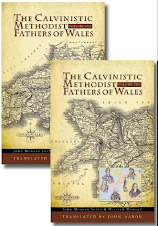In the second chapter of his book Pentecost ... Today? Iain Murray says this about the evangelist Finney, and refers to Elias
Finney’s teaching that revival should be normal and continuous, not extraordinary and occasional, depended for its success on a change in the content of revival. The same word now came to stand for any evangelistic campaign which gathered people together in numbers, and both Finney and his followers encouraged the switch. Finney had charged his opponents with being ‘enemies to revivals’. In reply they asserted that the opposite was the case and that it was for the very cause of revivals that they were speaking. (See, eg The Life and Labours of Asahel Nettleton 348-351). They feared that the new teaching was taking the work of the Spirit out of his own hands. ‘The influence of the Holy Spirit comes in only by the way,’ wrote Dod in his review of Finney’s lectures on Revivals of Religion (Princeton Essays 82). In Wales, John Elias, the Calvinistic Methodist leader, who had preached in many revivals, put his finger on the same point. When the new teaching first crossed the Atlantic, his question was: ‘Is there not a want of perceiving the corruption, obstinacy, and spiritual deadness of man, and the consequent necessity of the Almighty Spirit to enlighten and overcome him? (Letter to Rev Henry Rees, 2 March 1838: John Elias, Life, Letters and Essays Edinburgh: Banner of Truth, 1973, 259). As with brethren in the States, Elias dreaded lest ‘the legitimate results of erroneous principles shall be visited upon the ruined churches of our land.’ (The words are those of the author of the Preface to Letters of the Rev Dr Beecher and Rev Mr Nettleton on the New Measures’ in Conducting Revivals of Religion New York, 1828), 103).






No comments:
Post a Comment